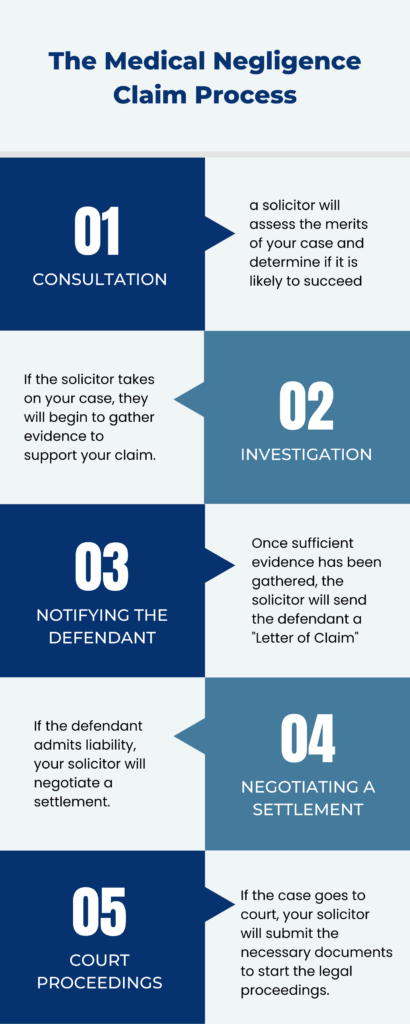Understanding the Medical Negligence Claim Process in the UK

In the United Kingdom, the medical negligence claim process is a legal process for patients who have suffered harm due to negligence by healthcare professionals. This article will provide an in-depth look into the claim process, answering key questions and providing valuable insights. We will cover the 3-year time limit, stages of the claim process, average payouts, and whether a solicitor is necessary. By the end, you will be well-equipped to navigate the medical negligence claim process in the UK.
What is Medical Negligence?
Medical negligence, also known as clinical negligence or medical malpractice, occurs when a healthcare professional breaches their duty of care towards a patient, resulting in harm or injury. This may include misdiagnosis, incorrect treatment, and surgical or medication errors. To make a successful claim, it is necessary to prove two key aspects:
- Negligence – The healthcare professional breached their duty of care.
- Causation – The patient’s harm or injury directly resulted from the negligence.
The 3-Year Time Limit for Medical Negligence Claims
One of the most important aspects of a medical negligence claim in the UK is the 3-year time limit. This means that the claim must be initiated within three years of:
- The date of the negligent act, or
- The date when the patient first became aware of the injury or harm caused by the negligence (also known as the ‘date of knowledge’).
There are some exceptions to this rule:
- Children – The 3-year time limit only begins once the child turns 18.
- Individuals with mental disabilities – The time limit may be extended indefinitely.
- Deceased patients – The 3-year limit starts from the date of death if the negligence led to the patient’s death.
How Long Does a Medical Negligence Claim Usually Take?
The duration of a medical negligence claim can vary significantly depending on the complexity of the case and the level of cooperation from the defendant. Generally, a claim can take anywhere from 18 months to several years to resolve. Factors that may impact the timeline include:
- The severity of the injuries sustained
- The amount of medical evidence required
- Whether liability is admitted or contested by the defendant
- The willingness of both parties to negotiate a settlement
Stages of the Medical Negligence Claim Process
Initial Consultation
During the initial consultation, a solicitor will assess the merits of your case and determine if it is likely to succeed. They will also explain the claim process and gather essential information about your situation.
Investigating the Claim
If the solicitor takes on your case, they will begin to gather evidence to support your claim. This may include medical records, expert opinions, and witness statements. This stage is crucial to establish both negligence and causation.
Notifying the Defendant
Once sufficient evidence has been gathered, the solicitor will send the defendant a “Letter of Claim” detailing the allegations of negligence and the injuries caused. The defendant has four months to respond, either admitting or denying liability.
Negotiating a Settlement
If the defendant admits liability, your solicitor will negotiate a settlement. This will consider the severity of the injuries, financial losses, and ongoing care costs. Negotiations may involve several offers and counteroffers before both parties reach an agreement. If the defendant denies liability or neither party can agree on a settlement, the case may proceed to court.
Issuing Court Proceedings
If the case goes to court, your solicitor will prepare and submit the necessary documents to initiate the legal proceedings. The court will then set a trial date, which may be months or even years in the future. During this time, your solicitor will continue to gather evidence and prepare for the trial.
Trial and Judgment
Both parties will present their evidence and arguments at the trial before a judge. The judge will then decide on the case, determining whether the defendant is liable and, if so, the amount of compensation to be awarded. It is important to note that most medical negligence claims in the UK are settled before reaching this stage.
Average Payout for Medical Negligence in the UK
The average payout for a medical negligence claim in the UK can vary greatly depending on the case’s specifics. Compensation is typically divided into two categories:
- General damages – This type of compensation covers the emotional and physical distress a person has experienced and any decrease in their quality of life due to negligence.
- Special damages – This type of compensation covers the money a person has lost or spent due to negligence, including costs for medical treatment, lost income, and any additional care expenses.
While providing an exact average payout is difficult, compensation amounts can range from a few thousand pounds for minor injuries to millions for severe, life-changing injuries or wrongful death cases.
Do I Need a Solicitor for a Medical Negligence Claim?
While having a solicitor for a medical negligence claim is not legally required, it is strongly recommended. Medical negligence cases can be complex and require extensive knowledge of medical terminology, legal procedures, and negotiation skills. A solicitor can:
- Evaluate the merits of your case
- Gather evidence and expert opinions
- Handle communication and negotiation with the defendant
- Provide guidance and support throughout the claim process
- Represent you in court if necessary
Additionally, many solicitors in the UK offer a “no win, no fee” arrangement, which means that you only pay their fees if your claim is successful.
Conclusion
Navigating the medical negligence claim process in the UK can be a daunting and time-consuming task. However, by understanding all the process aspects, such as the 3-year time limit, stages of the claim, average payouts, and the importance of hiring a solicitor, you will be better prepared to pursue your claim and seek the compensation you deserve. Remember that each case is unique, so seeking professional advice from a qualified solicitor is crucial for the best possible outcome.

